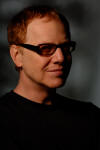
Due to a quirk in scheduling, our school year begins and ends much later than most. Last weekend we had our 2007 Commencement.
Our Commencement Speaker was Danny Elfman.
Elfman is, as anyone who hasn’t been hiding from Hollywood for the last twenty years knows, pretty much the most popular film composer of our day. His scores for director Tim Burton –
Beetlejuice, Batman, Edward Scissorhands, Big Fish et al – have something of a cult following. Other works, for
Dick Tracy, Mission: Impossible, Good Will Hunting, Men in Black, Chicago, Spiderman, as well as his theme music for
The Simpsons and
Desperate Housewives, have sealed his reputation as the most sought-after composer in the film business.
Our Chancellor, conductor John Mauceri, is an old friend and advocate of Elfman’s – he conducted the premiere of Elfman’s
Serenada Schizophrana with the American Composers Orchestra at Carnegie Hall a couple years back, and premiered his
Overeager Overture with the Hollywood Bowl Orchestra last fall. When Mauceri told Elfman that the North Carolina School of the Arts wanted to confer an honorary doctorate on him, Elfman happily accepted. It was only much later that he learned that he would have to make a commencement speech.
How could he not know that a speech would be required from the honorary doctorate recipient? Turns out ours was the first graduation ceremony Elfman ever attended.
Despite his protests to the contrary, Elfman is an excellent speaker. A sphinx-like economy of facial expression and gesture focuses attention on a generous vocal range. And he managed to say a lot of appropriate things without ever dipping into cliché.
He told the story of following his dream, not in order to encourage the graduates to follow their dreams, which they are obviously already doing, but in order to illustrate how many twists and turns that journey can take – to the extent that, in his case, the dream he followed ended up being different from what he had initially thought it would be. He described bouncing around the globe in his teens and twenties, trying to learn the violin, performing in an avant-garde acting troupe, starting a rock band. He said he had come very close to saying no when Tim Burton first asked him to score a film, because he didn’t think it was what he most wanted to do. Now he finds that all of his varied experiences play into his work. “There are no dead-ends in your life,” he said, “until you’re dead.”
Most revealingly, he said, “In my first 10 years as a film composer I was up against so much criticism, slander and abuse from my industry, it was astounding. Mean-spirited rumors were commonplace and abundant.
And I can tell you this, the frustration and anger I felt toward my detractors and those who took shots at me from high safe places became my greatest fuel.
I know this sounds really sick. And it is. But the point is that adversity, and the need to prove yourself and to show what you’re capable of can be a tremendous motivating factor. If you’re unlucky enough to find yourself overflowing with frustration like I was …
use it. Own it. Don’t waste it.
It’s not just fuel, it’s rocket fuel! And when your weapon is your talent,
revenge is sweet!”In a Q&A session the night before commencement, Elfman discussed his process of composing a film score, comparing it to solving a mathematical equation. He also lamented the current Hollywood scene, in which he says he is lucky if 30% of what he writes actually ends up in the film for which it was intended. Right now he is working on a film about Abu Ghraib, for which he will be paid one dollar – not a typical Hollywood project.
But the best quote, in my book, came from the commencement itself: “If you end up in the commercial arts, like I did, you may find yourselves up against an all too common beast: the combination of limited imaginations attached to egos larger than anything you thought possible.”



